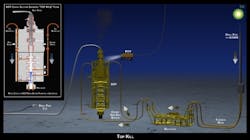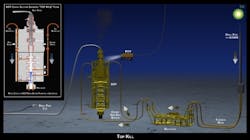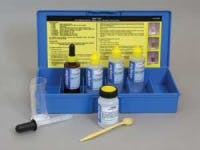BP oil spill: Slick enters Louisiana wetlands, loop current
May 20, 2010 -- Yesterday, Louisiana Governor Bobby Jindal toured the coastal areas of Plaquemines Parish and expressed dismay at what he saw. "The heavy oil is here... This was the day everybody was worried about," he said.
Governor Jindal estimated that more than 30 miles of the coast appeared oiled. He is actively trying to get approval from the Army Corps of Engineers for a dredging plan, under which "sand booms" would be constructed along the barrier islands. If approved, construction could begin in about 10 days.
Spill confirmed in loop current
Yesterday, NOAA issued a statement conceding that some oil has, in fact, entered the loop current.
The loop current is an area of warm water that comes up from the Caribbean into the Gulf of Mexico. It curves east then south, runs between Florida and Cube, and then becomes the Florida current. From there it travels up the east coast.
The agency maintains that oil transported along via the current will become "dilute and weathered," reducing its volume and thinning out its consistency, and may not even reach Florida shores as feared.
Cleanup effort or publicity stunt?
One thing has been consistent throughout this disaster: Everyone wants to help. Hundreds -- perhaps even thousands -- of engineers, scientists and well meaning citizens have submitted technology suggestions to BP. To date, none of them have been employed. That may soon change, however. BP has agreed to test a technology brought to them by Kevin Costner, famed actor of Waterworld (no, the other Waterworld) and countless other films. For over a decade, Costner has been funding a team of researchers to develop technology for cleaning up oil spills. The result is an extraction machine that sucks in dirty, oily water and spits out water that is 99% clean.
Media Access
There have been reports that the media has been barred "on BP's orders" from accessing certain locations. Deepwater Horizon Unified Command issued a statement categorically denying that to be the case, saying, "Neither BP nor the U.S. Coast Guard, who are responding to the spill, have any rules in place that would prohibit media access to impacted areas and we were disappointed to hear of this incident."
Media would only be barred, they explained, if they were interfering with response operations or at risk for their own safety.
Status of top kill operation
As of today, systems are still a go for deployment of the top kill strategy. On Sunday, BP engineers plan to inject mud and cement into the damaged blowout preventer, then follow with cement (see illustration). The goal is to plug up the well head and permanently seal it off until it can be disabled via the relief wells, which are still under construction.
Other response effortsTraditional response efforts are ongoing. Yesterday, favorable weather conditions enabled a controlled burn for about 9 hours. Regular and sorbent booms are being deployed. And dispersants continue to be applied on the surface and underwater. This tactic has been highly criticized by environmentalists and some members of the scientific community.
In a statement before the Senate Committee on Environment and Public Works yesterday, EPA Administrator Lisa Jackson said, "We are working with manufacturers, with BP and with others, to get less toxic dispersants to the response site as quickly as possible."
Bloomberg Businessweek reported today that BP is in fact considering four other, less toxic dispersants than the Correxit product it has been using. Correxit is manufactured by Nalco and some variations of the product have been banned in the UK.
By the numbers
The following list represents the latest response effort tallies according to Deepwater Horizon Unified Command:
Total response vessels: 1040
Containment Boom deployed: more than 1.43 million feet
Containment boom available: more than 370,000 feet
Sorbent boom deployed: more than 560,000 feet
Sorbent boom available: more than 1.28 million feet
Total boom deployed: more than 2 million feet (regular plus sorbent boom)
Total boom available: more than 1.65 million feet (regular plus sorbent boom)
Oily water recovered: more than 8.37 million gallon
Dispersant used: more than 600,000 gallons
Dispersant available: more than 340,000 gallons
Overall personnel responding: more than 24,700
Related Articles
BP oil spill: Tar balls found on Keys shoreline not linked to Deepwater Horizon >
BP oil spill: Some oil could enter loop current; Fishery closures in gulf waters to expand >
BP oil spill: Siphon now working, collecting 'some' oil; Concerns turn toward 'loop current' >
BP oil spill: Setback in attempt to siphon oil from gulf waters, engineers will try again >
BP oil spill: Cleanup battle rages on in waters of Gulf of Mexico >
BP oil spill: Update on cleanup of gulf waters, underwater video released>
BP oil spill: Clean up of gulf waters continues >
BP oil spill: Measures to mitigate wetland damage, stem flow ...>
BP oil spill: Clean-up attempt fails, wetlands under grave threat >
###



